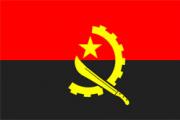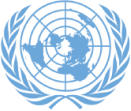Security Council
Open DebatePiracy and Armed Robbery at Sea in the
Gulf of Guinea
25 April 2016
Statement
Mr. President,
Angola is very honored to co-sponsor this Open Debate, with China and Senegal, on Piracy and Armed Robbery at Sea in the Gulf of Guinea.
The insights provided by Assistant Secretary General Mr. Taye-Brook Zerioun were most valuable in outlining the subject matter we are considering in this important debate
Mr. President,
The Gulf of Guinea and the waters beyond play a crucial strategic role in the Atlantic: it is at the center of the main waterway connecting Europe, Africa, and towards the Western hemisphere; historically, it was the key factor in the establishment, after the 16th century, of the first economic globalization, with such deep-seaded consequences.
Then, the roots of the problem we are discussing today, piracy and armed robbery in the Gulf of Guinea, took hold in the region for a long period of time: in the pathway of world trade that fed the markets of the Americas with labor force, and supplied Europe with the precious goods from the new world, and from the East, piracy emerged at that point in time as a side-effect of the intense trade across the region and as a very profitable economic activity, frequently sponsored by States.
Since then, a strategic and organic link was established between the two shores of the Atlantic. Centered in the Gulf of Guinea, it gained renewed prominence in the last decade, with the emergence in the region of security threats and transnational criminality, a reality requiring an integrated and collective response by the States bordering the South Atlantic. In fact, countries of the South Atlantic eastern shore, besides being the source or transit of criminal activities, most notably drug trafficking, which resonate in the Gulf of Guinea and beyond, also face impending threats of the possible disruption of trade routes.
Mr. President,
The Gulf of Guinea is the main access to the world for countries at its shores, as well as for landlocked ones in their rear, in acceding to the Atlantic, for the import and export of goods and services.
The seas of the Gulf of Guinea currently face serious security threats. Vulnerable maritime routes and porous land borders allow an increase in transnational crime, piracy, armed robbery, illegal fishing, human traffic, illegal immigration, smuggling of drugs and weapons.
In the current decade, such activities have caused enormous losses to the African maritime sector, hindering trade and the continent´s development.
Given the complex ramifications of maritime insecurity it is imperative that the international community mobilizes and harmonizes efforts in order to find lasting solutions.
By today´s adoption of the Presidential Statement on the issue of piracy and armed robbery in the Gulf of Guinea, the Security Council is giving a strong signal over the international community concern and resolve to address the threat posed by such phenomenon to international navigation, to security and to economic development of the countries of the region; on the potential links with terrorist groups in West Africa and the Sahel; on the conditions necessary for the durable eradication of such scourge, namely the attainment of regional peace and security, the need to strengthen state institutions, promote economic and social development, respect human rights and the rule of law; and, the need to coordinate international assistance in support of national and regional efforts to assist member States to address such threats.
Mr. President,
Countries bordering the Gulf of Guinea have joined efforts. In 2009, the Economic Community of Central African States (ECCAS) adopted a maritime security strategy, establishing information sharing, community surveillance and asset management mechanisms, while strengthening national legal frameworks and training.
ECCAS set up a Regional Coordination Centre for Maritime Security for Central Africa, in Yaoundé, Cameroon, dividing its maritime space in zones and instituting joint patrols. However, ECCAS limited capacity to respond to the growing insecurity challenges remains a major constraint. In 2012 a new maritime zone was established, under ECOWAS supervision, in order to upgrade the capacity to face these threats.
Angola, with a long maritime coast, vital for its security and economic development, is deeply committed with the African Union Maritime Integrated Strategy. Designed until 2050, the Strategy recognizes the potential of the maritime sector in promoting economic development, boost trade and improve the living conditions of more than 700 million Africans in the continent.
Through its Representation in the International Maritime Organization (IMO), Angola has been actively involved in discussions and in implementing measures adopted by IMO to enhance maritime security, particularly in the Gulf of Guinea.
Moreover, Angola joined a number of arrangements dealing with the issue, namely in the framework of ECCAS, the Gulf of Guinea Commission (CGG) and the Southern African Development Community (SADC); Angola signed the Declaration of the Heads of State and Government of Central and West Africa on Maritime Safety and Security; is also a signatory State of the Memorandum of Understanding among ECCAS, ECOWAS and The Gulf of Guinea Commission on Maritime Safety and Security in West and Central Africa; and is a part of the Code of Conduct for the Repression of Piracy and Armed Robbery Against Ships, and Illicit Maritime Activity in West and Central Africa.
In line with Security Council resolutions 2018 and 2039, in March 2015 Angola and the IMO organized a regional meeting to advance the implementation of the Yaoundé Code of Conduct on the repression of piracy and armed robbery against ships and illicit maritime activities in West and Central Africa.
Still translating the importance it attaches to this issue, Angola organized in cooperation with other partners the International Conference on Maritime and Energy Security, (CISME) in October 2015. The meeting focused on capacity building and on a holistic approach in implementing African maritime security strategies, highlighting the importance of integrated and complementary strategies among the countries of the region, through the sharing of information and the establishment of closer regional and international cooperation.
As the Conference´s outcome a Declaration on Maritime and Energy Security was adopted, in which the participants emphasized, inter alia, the importance of establishing partnerships at the regional and international level, including technical assistance, training, joint exercises and the adoption of feasible strategies and plans of action.
Although tangible measures to enhance maritime security have been adopted, much more needs to be done by the countries bordering on the Gulf of Guinea, which still face huge challenges.
We believe that by working in a spirit of cooperation and solidarity, it will be possible to overcome the challenges of piracy and other security threats affecting the Gulf of Guinea. Angola stands ready to work with countries of the region, regional and international organizations towards such endeavor.
In conclusion, Angola advocates and promotes the adoption of maritime security strategies consistent with the prevailing situation in the Gulf of Guinea and southern Africa, and in response to its international repercussions.
And finally, Mr. President, we are of the view that the adoption by the Security Council of the Presidential Statement on Peace Consolidation in West Africa: piracy and armed robbery at sea, and the points of view expressed in this Open Debate by the entire UN membership will positively resonate on the aspirations of the peoples of the region to well-being and development.
I thank you, Mr. President.


